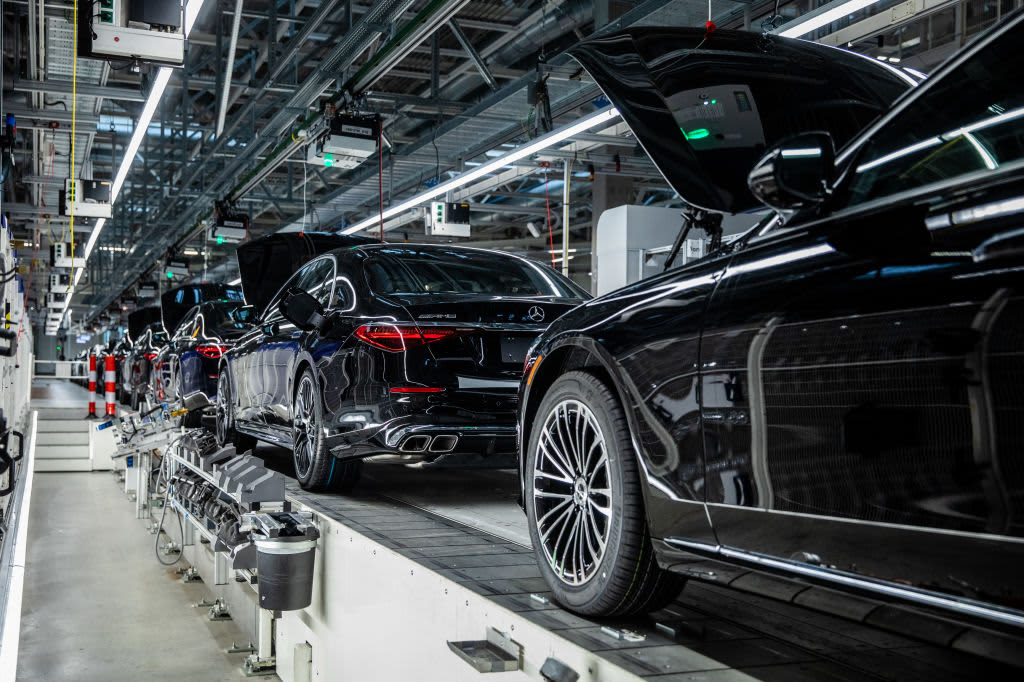Car manufacturers have a number of ways to mitigate the impact of the European Union’s stricter emissions targets, although analysts say all options are likely to come at a significant cost.
The prospect of steep fines for failing to comply with the bloc’s new emissions standards has sparked a heated debate within the car industry, particularly given that the sector is currently not on track to achieve this year’s goal.
A perfect storm of challenges on the road to full electrification ensured major original equipment manufacturers (OEMs) endured a torrid time in 2024 — and few expect 2025 to be much better.
The European Union’s cap on average emissions from new vehicles sales falls to 93.6 grams of carbon dioxide per kilometer (g/km) in 2025, reflecting a 15% decrease from a 2021 baseline of 110.1 g/km.
Exceeding those limits — which were agreed in 2019 and form part of the 27-nation bloc’s ambition to reach climate neutrality by 2050 — can result in fines amounting to several billion euros.
“Everyone is in the dark around this question,” Rico Luman, senior sector economist for transport and logistics at Dutch bank ING, told CNBC via video call.
Read more
“It is such a big deal because they are still struggling to make the shift and to restructure, as we have seen with all that is ongoing at VW over the last couple of weeks and months while adjusting the organization to the new world,” Luman said.
“There is a long-term interest in terms of keeping up with competitors. I mean, the direction of travel is pretty clear. So, in the end, they will need to achieve it, but in the short run, it’s not that attractive for them because it hurts them in many ways,” he added.
What action can be taken?
Most of Europe’s top car giants are currently far from reaching the EU’s new CO2 target, ING’s Luman said, which means action is necessary to mitigate the impact of the financial penalties.
Some of the options on the table include pushing battery electric vehicle (EV) sales by rolling out more affordable models and lowering prices, reducing conventional internal combustion engine (ICE) production in favor of plug-in EVs and hybrid models, and “pooling” with competitors that already comply with the target. Alternatively, car firms could simply pay the fines.
Pooling refers to the process in which car manufacturers team up to be considered as one entity when calculating their performance against a CO2 emissions target.
At present, Sweden’s Volvo is thought to be the only large automaker to have managed to comply with the target, alongside U.S. EV manufacturer Tesla
Stephen Reitman, head of European automotive Research at Bernstein, said automakers operating in Europe face a “massive emissions cliff” this year given the tightening of the EU’s regulations.
“Now they can mitigate that by pooling with companies which have excess greenhouse credits. But those companies are one, Tesla, and the other big one is Volvo, which is owned by [China’s] Geely,” Reitman told CNBC’s “Squawk Box Europe” on Thursday.
“And a lot of the cars that Tesla is selling in Europe, which is generating its greenhouse credits, are coming from China. So, basically, you’re seeing a transfer of money of European automakers to Chinese entities or to businesses which have originated in China, which is maybe not the best look for the EU and for national governments,” he added.
A heated debate
Some of Europe’s OEMs have expressed concern about the tightening of carbon regulations in Europe, particularly as electric vehicle demand falters.
The European Automobile Manufacturers’ Association (ACEA), an industry lobby group, has called on the European Commission to provide “urgent relief measures” on the new rules, while German Chancellor Olaf Scholz has said there should be no fines for car companies that fail to adhere to the new standards.
For some, any move to water down or delay the EU’s tougher carbon rules would be the same as scrapping the regulation altogether.
Julia Poliscanova, senior director for vehicles and e-mobility supply chains at the campaign group Transport & Environment, told CNBC last month that the rules are designed to help make the carmakers more competitive — even if it is to the detriment to some of their higher profit margins in the near term.
“We are behind on electrification. So, how on Earth does delaying the target and making us even more behind going to help the industry? I don’t get it. I just don’t get how it helps the transition they have to go through,” Poliscanova said.
European Commission President Ursula von der Leyen said late last year that she would convene a strategic dialogue on the future of Europe’s automotive industry.
The dialogue, which is scheduled to be officially launched this month, is designed to swiftly implement measures the sector urgently needs.
International: Top News And Analysis
Read the full article <a href="Read More” target=”_blank”>here.


